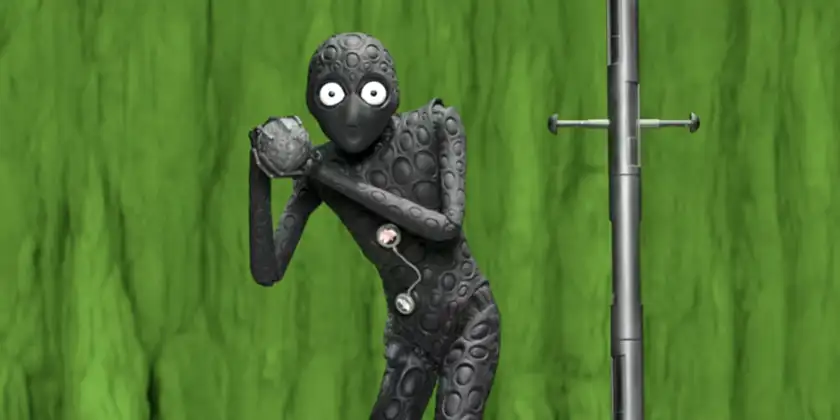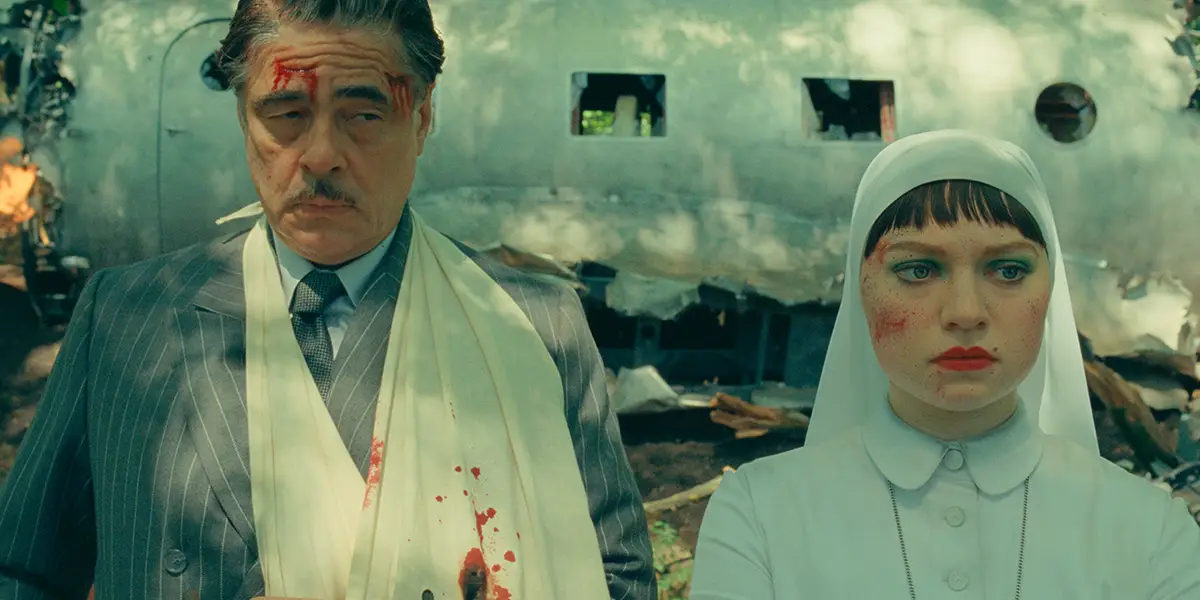Wes Anderson asks questions about faith and God in Asteroid City and The Phoenician Scheme, emphasizing uncertainty and sacrifice.
Wes Anderson is wrestling with God, and perhaps his own faith, resulting in two of his most existential films. 2023’s Asteroid City and this year’s The Phoenician Scheme maintain the director’s signature structure and style, but delve into deeper thematic territory. While some of his other movies certainly address fundamental questions about life and meaning (Fantastic Mr. Fox, for example), these two films place faith, belief, grief, and sacrifice at their center. And while Anderson doesn’t clearly answer every question he poses in these two works, there is a consistent throughline: Genuine faith requires us to keep pressing on even when we feel lost, and sometimes that faith also requires personal sacrifice.
This analysis contains spoilers for both films.
Belief and Disbelief in Asteroid City
Asteroid City, at its core, explores how humanity reacts to an event that either shakes or enhances faith. Structurally tricky, the film is technically a TV show about a play. Much of the story on screen represents the plot of that play, set in a fictional town named, you guessed it, Asteroid City. Pulling from both science fiction and westerns, the “play” portion of the film (shot in color) follows a group of adults and children alike converging on the town to take part in the Junior Stargazers convention. The town is racked with strange occurrences, including nearby nuclear bomb testing that serves as a reminder of humanity’s capacity for evil and destruction, and an unfinished driving ramp that leads to nowhere that symbolizes confusion about where life may take us.
The film’s centerpiece is a whimsical, vibrant scene where an alien arrives, retrieves an asteroid that had struck the center of the town years before, and quickly ascends back into space, leaving the convention goers utterly awestruck. What makes the scene work so well, other than Anderson’s undeniable style and Alexandre Desplat’s lovely score, is the way it marks a turning point for many of the characters, whose arcs and beliefs have been established beforehand.
Many of them before the encounter were sure about what they believed, though some had been going through a season of uncertainty. Augie (Jason Schwartzman) holds a firm, if strained, skepticism (he tells his children that “heaven doesn’t exist for me, but you’re Episcopalian”). The alien encounter shakes both his and his son Woodrow’s (Jake Ryan) certainty, albeit in opposite directions; Woodrow goes from being Episcopalian to declaring towards the film’s end “I don’t believe in God anymore..

If this seems like too much religious language in a movie supposedly about science, let’s remember that aliens often symbolize God or the divine in fiction. It’s easy to see how that interpretation fits nicely into the themes Asteroid City is exploring. If we treat the alien arrival as a symbol for an encounter with transcendence, Augie and Woodrow’s reactions are symbols for how real people might react when faced with a life-changing event. Whether it be aliens, God, or some other phenomenon out of our control, humans respond differently.
In the film, the government forces a quarantine upon those who witnessed the alien, referencing the COVID-19 pandemic, one of the most faith-shaking happenings in recent memory, to which people responded in a variety of ways. During this quarantine, a group of children ask questions about the alien to their teacher (Maya Hawke); one even writes a song with prayerful lyrics that are strikingly similar to the Lord’s Prayer in the Gospels. In fact, prayers take up significant screen time in Asteroid City, mostly from the younger characters: this feels like a direct reference to Jesus commending the faith of children, also in the Gospels.
Is there a “correct” reaction to such an occurrence? Anderson doesn’t seem to answer, though he does give what is one of the most accurate explanations of faith ever put on film. While performing the play, the actor portraying Augie abruptly walks off stage. He approaches the director, Schubert Green (Adrien Brody), and declares: “I don’t understand the play.” Anderson presents the play itself as a metaphor for life (drawing from Shakespeare: “All the world’s a stage, and all the men and women merely players”). He continually asks the director if he’s “doing it right,” and laments about the wounded nature of the character he’s playing. Green assures him he’s doing a fine job. “I still don’t understand the play,” the actor says again. “It doesn’t matter. Just keep telling the story,” Green responds.
Faith, then, is continuing on in life even when things happen that shake or hurt us. It’s telling the story even when we don’t fully understand the story we’re telling. The characters in Asteroid City eventually get to that place; they keep living, even in the mists of confusion, chaos, and even evil.
Faith and Works in The Phoenician Scheme
Zsa-Zsa Corda (Benicio del Toro) falls more on the evil side than he does on the side of goodness and faith, at least at the start of Anderson’s latest The Phoenician Scheme. Corda is an arms dealer and industrialist, with plenty of shady stories littering his past. He thinks only of his money and his influence, until the most recent attempt on his life leaves him bordering on the edge of death. The film intercuts scenes of Corda on trial in what is assumed to be Heaven or Purgatory. “Let us consider his life and deeds!” a divine judge says of Corda. This is a problem for Corda, however, as his life has been filled with, as his nun daughter Liesl (Mia Threapleton) says, “unholy mischief.”

As father and daughter embark on their adventures, the audience sees Corda’s lack of humanity (also expressed in del Toro’s deadpan performance). He makes deals by offering up free hand grenades and shows little affection for those around him, including his business partners, his hired tutor/assistant Bjorn (Michael Cera) and even his own sons. All the while, the movie cuts back to Corda’s transcendent trial, where he offers up a deer stuffed full of gold coins. It’s clear that this “sacrifice” is rejected.
A common theme in the Biblical texts (especially the New Testament) is the relationship between faith and works. Corda tries to jump back and forth between the two, when in reality, the ideas are meant to coexist. Liesel tells him that it’s the “sincerity of devotion” that constitutes true transcendence and salvation, not just his works. In a real sacrificial act, counter to the fake one he tries to enact while on his heavenly trial, Corda gives up his fortune, begins paying his workers, and starts a small bistro with his daughter. In an act of genuine faith, he finds the true meaning of family, giving his life a better purpose than he ever had as an influential but corrupt businessman.
Giving in to Faith
Both films use life-changing events (an alien encounter in one, a near-death experience in the other) to put their characters at a crossroads to either accept or reject faith. Some respond with certainty, others with denial, but Anderson is more interested in a third option: certainty in uncertainty. In a world of grief, loss, chaos, and contradiction, these two films suggest that embracing complexity requires more faith than spurning it.
In Asteroid City, a group of actors are instructed to pretend to be asleep as an acting exercise. One by one, they rise and say, “you can’t wake up if you don’t fall asleep.” The alien appears on screen as the actors begin chanting the line in complete unison, transcendence arriving after surrender. We cannot experience true faith until we open ourselves to it. And in Anderson’s world, faith means telling the story, even when we don’t fully understand it.
Asteroid City is now available to watch on digital and on demand. The Phoenician Scheme will be released on digital platforms on July 8, 2025 and on 4K UHD and Blu-Ray on July 29. Read our reviews of Asteroid City and The Phoenician Scheme!

